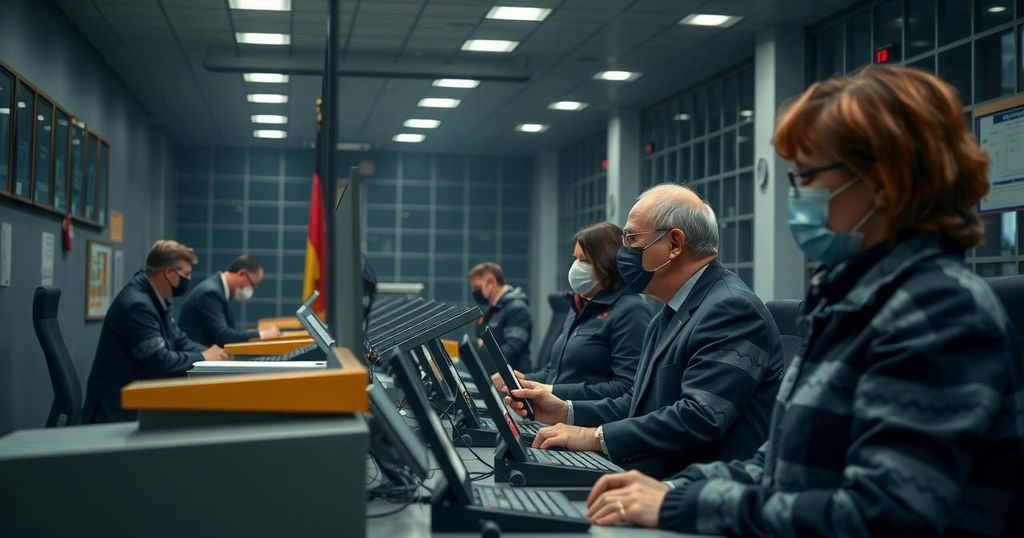World news
ANGELA MERKEL, ASIA, BUNDESTAG, CHINA, CHRISTIAN DEMOCRATIC UNION, CHRISTIAN SOCIAL UNION, DEFENSE SPENDING, DEMONSTRATIONS, EUROPE, EUROPE/ASIA, EUROPEAN UNION, GAZA, GAZA STRIP, GERMANY, ISRAEL, MEXICO, NORTH AMERICA, OLAF SCHOLZ, POLITICS, RUSSIA, SCHOLZ, SPD, STEINMEIER, UKRAINE, UNITED STATES, US PRESIDENTIAL ELECTION, WALTER STEINMEIER
Ethan Kim
0 Comments
Germany to Hold Snap Elections on February 23 Amid Political Turmoil
Germany will hold snap elections on February 23, 2024, following the collapse of Chancellor Scholz’s coalition government. The election date was a result of negotiations between major political parties and reflects urgent calls for stable leadership amid economic challenges. A confidence vote on December 16 is expected to initiate the process leading to the elections.
Germany is poised to conduct snap elections on February 23, 2024, following the collapse of Chancellor Olaf Scholz’s three-party coalition. The decision, reached by the major political parties, serves as a compromise after the opposition advocated for an early January vote to mitigate a leadership vacuum, while Scholz sought to delay the elections until mid-March for adequate preparation. This election date contingent on a confidence vote for Scholz on December 16, which he is anticipated to lose, will necessitate President Frank-Walter Steinmeier to dissolve the Bundestag within a 21-day timeframe thereafter. The urgency for elections arises amid economic challenges for Germany, which is projected to experience a second consecutive year of economic contraction, exacerbated by rising inflation, geopolitical tensions from Russia’s conflict in Ukraine, and shifting global trade dynamics. As Europe’s largest economy, the results of this election are poised to affect not only Germany’s domestic policy but also its role within the European Union and international alliances, particularly in light of the forthcoming presidency of Donald Trump. Scholz’s coalition government was first established in late 2021, marking the trend toward increasingly fragmented political allegiances in Germany. The recent split from the Free Democratic Party came in the wake of significant discord over fiscal policy, prompting electoral uncertainty just as pressures mount from the rising far-right Alternative for Germany party, which is gaining traction in the polls. Currently, the conservative CDU-CSU alliance leads with 32 percent, indicating the necessity for complex coalition negotiations post-election to form a governing majority.
The article addresses the political unrest in Germany following the breakdown of Chancellor Olaf Scholz’s coalition government, which consisted of the Social Democratic Party (SPD), the Greens, and the Free Democratic Party (FDP). This coalition was historic as it marked Germany’s first three-way alliance at the national level; however, policy disputes, particularly around fiscal matters, led to its dissolution. The political landscape in Germany is increasingly fragmented with the rise of alternative parties posing challenges for traditional coalitions, reflecting shifting voter sentiments. The forthcoming elections serve to determine the future leadership amid a backdrop of economic and geopolitical instability that further complicates governance in Germany and the European Union.
In conclusion, Germany’s upcoming snap elections on February 23 are a significant response to the recent collapse of Chancellor Scholz’s coalition government. The elections come at a time of economic uncertainty and international pressures, setting the stage for potential shifts in Germany’s political landscape. As the major parties prepare for this critical vote, the outcome will not only influence Germany’s domestic policies but also its standing and influence within the European Union and beyond.
Original Source: www.aljazeera.com




Post Comment